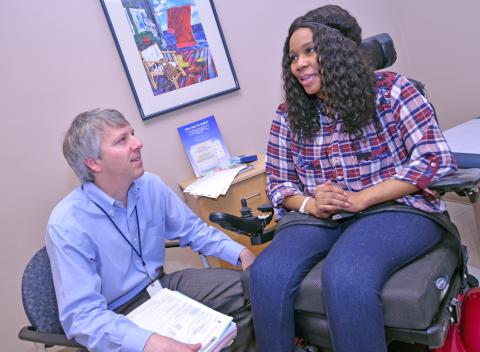New urology services at Methodist Rehab address unique needs of people with spinal cord injuries

Not everyone would travel over two hours for a doctor’s appointment, but it makes sense for Shameka Price of Sardis.
Since sustaining a spinal cord injury in 2012, Price has relied on the expertise of staff at Methodist Rehabilitation Center to meet her medical needs. So when she learned the Jackson hospital had added outpatient urology services, the 24-year-old hit the road once again.
“I had my first urinary tract infection last year, and I knew it was time to start seeing a urologist,” Price said. “It helps that I can now get everything I need in one location.”
In January, University of Mississippi Medical Center urologist Clint Collins began seeing patients at MRC’s hospital-based outpatient clinic, thanks in part to a recent affiliation agreement between the two health care facilities.
“The alliance encourages us to share expertise, and Dr. Collins’ specialty definitely suits the needs of our patient population,” said Dr. Sam Grissom, medical director at MRC.
“Bladder problems are prevalent among people with spinal cord injuries and can lead to life threatening complications. So it’s beneficial for our patients to have easy access to a board-certified urologist like Dr. Collins.”
More than 70 percent of people with spinal cord injuries suffer some degree of bladder dysfunction. Many have neurogenic bladder, a condition in which nervous system damage impacts bladder control.
Those with overactive bladders often struggle with incontinence and frequent urges to urinate. “It’s a quality of life issue,” Dr. Collins said. “I have patients who don’t go out of their house because they are leaking urine or can’t get to a toilet in time.”
Those with underactive bladders face risks related to the organ’s role as a storage vessel.
“The bladder needs to be large enough to hold urine between trips to the bathroom and stretch enough to hold that urine under low pressure,” Dr. Collins explained. “To store well, the outlet needs to stay closed while the bladder fills. Once it’s full, the bladder wall muscle should contract, relaxing the outlet and releasing urine. But in patients with spinal cord injuries, some or all of these criteria for bladder storage and emptying are uncoordinated or absent.”
Serious problems can arise when an overfull bladder puts increased pressure on the kidneys, causing severe kidney infections and possible kidney failure. “And it’s something most patients are completely unaware of,” Dr. Collins said.
A variety of treatments address neurogenic bladder, including behavioral changes, intermittent self-catheterization, drug therapy, neuromodulation therapy and surgery. One of the latest approaches uses injections of paralyzing botulinum toxin to control bladder contractions and decrease pressure.
People with spinal cord injuries often don’t visit urologists until they’ve experienced a urinary tract infection, but Dr. Collins says he recommends an annual check-up for SCI patients.
“I recommend looking in the bladder with a scope periodically, especially when patients are having frequent infections,” Dr. Collins said. “I need to make sure patients don’t have stones in their kidneys or bladder, as these stones can trap bacteria and lead to recurrent infections. I check for signs of increased pressure to the kidney, usually with a kidney ultrasound, and follow up with patients regarding how their bladder management is working with their lifestyle.
“Quality of life is important, and while I cannot wave a magic wand and make everything work again, we can often help significantly using various management and treatment strategies.”
As he diagnoses and treats patients at MRC, Dr. Collins is aided by UMMC nurse practitioner Nichole Anderson. “She has expertise in the urologic workup and management of these complicated patients and is a huge asset for MRC and their patients,” he said.
Dr. Collins said he also benefits from the experience of MRC staff members who work in the hospital’s outpatient clinic.
“The same nurses help with Dr. Grissom’s clinic, and outpatient clinic nurse practitioner K.K. Ramsey is often seeing patients alongside me as she helps them manage spasms,” he said. “All the support staff is familiar with the patients and are very helpful getting things coordinated efficiently.”
Staff members, in turn, appreciate Dr. Collins’ commitment to helping patients stay healthy.
“He gives patients feedback and education at the time of the visit,” said registered nurse Donna Short, urology coordinator at MRC. “He’s able to thoroughly assess their bladder management and order, perform and interpret urology studies, if required.”
Urodynamic studies and cystoscopies are often needed to measure urinary tract function, and Dr. Collins says MRC staffers are pros at expediting the procedures.
“The radiology technicians have been doing this so long we did five or six urodynamic studies and three cystoscopies on a Friday while I was seeing patients,” Dr. Collins said. “A lot were add-ons and the staff said: ‘Sure, no problem.’
“It’s good to have the capability to perform procedures when you need to and not have to schedule them a month out. Everybody works hard to get as much as possible done for the patient while they are here. This is very important given the coordination, effort and cost often associated with transporting these patients to clinics.”
Such convenience means a lot to patients like Price. “It’s very helpful when you don’t have to go to so many places,” she said. And she enjoys being in a setting where she knows staff understands the needs of patients with neurological problems.
“They can exchange notes and help Dr. Collins understand what’s going on with us,” she said.
Dr. Clint Collins provides urology services to current and former Methodist Rehab patients at MRC’s hospital-based outpatient clinic in Jackson. For information, call 601-364-3392.